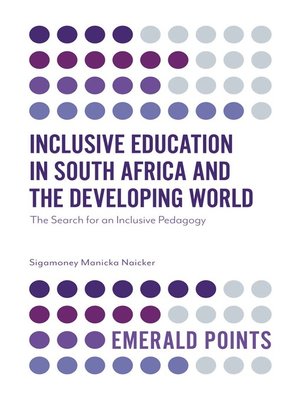Inclusive Education in South Africa and the Developing World
ebook ∣ The Search for an Inclusive Pedagogy · Emerald Points
By Sigamoney Manicka Naicker

Sign up to save your library
With an OverDrive account, you can save your favorite libraries for at-a-glance information about availability. Find out more about OverDrive accounts.
Find this title in Libby, the library reading app by OverDrive.



Search for a digital library with this title
Title found at these libraries:
| Library Name | Distance |
|---|---|
| Loading... |
This book offers policy makers, teachers and teacher trainers a framework for understanding inclusive education in the developing world.
With a major focus on South Africa, it argues that planning for inclusive education must rupture old theories, assumptions, models and tools - including a recognition of how the history of special education has psychologized failure - with the mainstream taking ownership of the transformation to a fairer system. The author contends that for inclusive education to take hold, policy makers need to contextualize the curriculum to the needs of the developing country, and to place the vulnerable and working class demographic at the heart of the planning process - recognizing that the performative culture of developed countries will marginalize and alienate this majority group.
Providing practical guidelines on developing full-service schools that can cater for learners who experience a range of barriers to learning, Inclusive Education in South Africa and the Developing World will be of great value to all those with an interest in education, inclusion and social justice both within South Africa and beyond.
With a major focus on South Africa, it argues that planning for inclusive education must rupture old theories, assumptions, models and tools - including a recognition of how the history of special education has psychologized failure - with the mainstream taking ownership of the transformation to a fairer system. The author contends that for inclusive education to take hold, policy makers need to contextualize the curriculum to the needs of the developing country, and to place the vulnerable and working class demographic at the heart of the planning process - recognizing that the performative culture of developed countries will marginalize and alienate this majority group.
Providing practical guidelines on developing full-service schools that can cater for learners who experience a range of barriers to learning, Inclusive Education in South Africa and the Developing World will be of great value to all those with an interest in education, inclusion and social justice both within South Africa and beyond.







